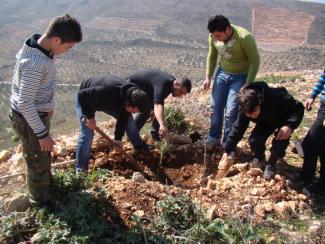During the past 50 years, Lebanon’s forest cover declined by 17 percent. Historically home to numerous native species and the largest pine forest in the Middle East, Lebanon loses approximately 1,500 to 2,000 hectares annually to wildfire and deforestation. These forests provide economic opportunities for many Lebanese and support ecological stability in an ever-changing regional climate. Natural springs and mountain water sources also play a key role in Lebanon’s environment and the protection of its forests. More than 2,000 springs, however, are threatened by rapid population growth, unplanned development, misuse and pollution.
USAID works with many Lebanese groups nationwide to promote Lebanon’s environmental diversity through conservation, awareness and reforestation. Our assistance includes:
- Planting native trees and reversing environmental degradation by reforesting grasslands, shrub-lands and areas burned by wildfires.>
- Providing technical support and small-scale infrastructure assistance to the Litani River Authority to help it more efficiently and sustainably manage the Litani River Basin.
- Supporting the development of rural and ecological tourism destinations.

USAID
